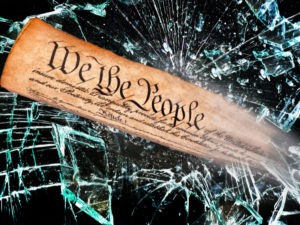
American politics has always involved parties maneuvering to achieve their goals. In the past, the fundamental building blocks of the constitution have been out of bounds when it comes to these political games. Now though, Democrats, stymied by Donald Trump’s presidential win, have begun to imagine new ways to get what they want. Some of what they have in mind challenges not only tradition, but the constitution itself.
In recent weeks Democrats have announced their desire to make drastic changes to the nation’s constitution. The first major change Democrats want to make is adding Supreme Court seats, with what they presume will be a Democrat President in 2020. A progressive president adding new justices would tip the balance in favor of the liberals on the court, and lead to a drastically different interpretation of the constitution.
The second major change Democrats have signaled is the abolition of the Electoral College. The move would make America a direct democracy when it comes to electing a president. The voting power of rural Americans would be extinguished overnight. Despite what you may hear, America is not a democracy. In fact, you won’t find that word anywhere in the constitution.
At The Wall Street Journal, the Editorial Board discusses the Democrats’ plans to alter America’s founding document further, writing:
Last week we wrote about Democratic ambitions to pack the Supreme Court. This week the Electoral College is on the chopping block as Senator Elizabeth Warren comes out in favor of its abolition, Beto O’Rourke makes sympathetic noises and Colorado’s Democratic Governor signs a bill adding his state to the “National Popular Vote Interstate Compact.” Scrapping the system the U.S. has used to select Presidents since its founding will likely soon be the Democrats’ default position.
Like the Supreme Court, the Electoral College sometimes frustrates the will of political majorities. That makes it an easy target in this populist age. But while “majority rules” has always been an appealing slogan, it’s an insufficient principle for structuring an electoral system in the U.S.
Presidential elections often do not produce popular majorities. In 2016 neither Hillary Clinton nor Donald Trump won 50%. “Plurality rules” doesn’t have the same ring to it. In the absence of the Electoral College, the winner’s vote share would likely be significantly smaller than is common today. Third-party candidates who can’t realistically win a majority in any state would have a greater incentive to enter the race.
Democrats are upset that Mr. Trump is President with 46% of the vote to Ms. Clinton’s 48%. What if a Republican was elected with a third of the vote in an election featuring five formidable third-party candidates? A free-for-all plebiscite would hurt the system’s legitimacy. The Electoral College helps narrow the field to two serious contenders, as voters decide not to waste their vote on candidates who have no chance to win.
The founders designed the Electoral College to help ensure that states with diverse preferences could cohere under a single federal government. Anyone who thinks this concern is irrelevant today hasn’t been paying attention to the current polarization in American politics. The Electoral College helps check polarization by forcing presidential candidates to campaign in competitive states across the country, instead of spending all their time trying to motivate turnout in populous partisan strongholds.
Read more here.



